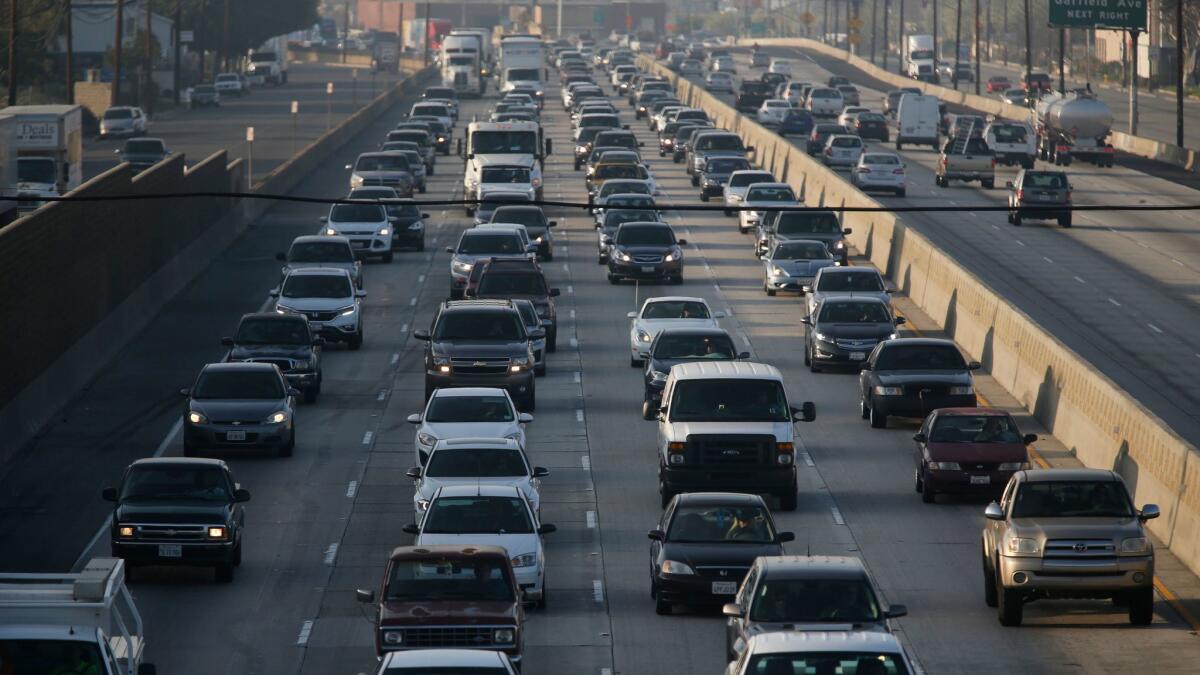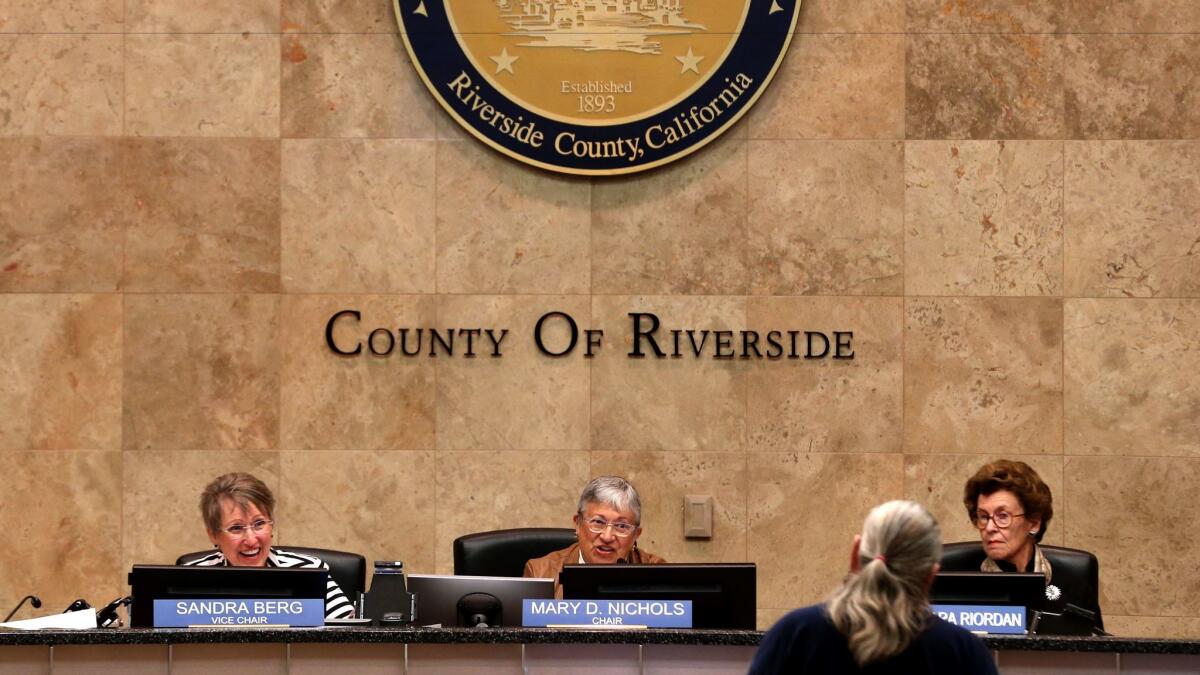Trump administration backs away from fight over California’s power to set rules for cars and trucks

Reporting from Sacramento — The Trump administration is backing off its threat to revoke California’s unique authority to set its own tough pollution standards for cars and trucks — rules that have become a crucial tool for states to combat climate change without help from Washington.
Environmental Protection Agency Administrator Scott Pruitt assured lawmakers on Thursday that his agency is not currently looking to take away the power that California has used for decades to reduce emissions that cause smog and heat up the planet.
Earlier this year, Pruitt had suggested that the Trump administration might try to weaken or revoke California’s authority, which would have put Washington on a collision course with the state over a crucial environmental issue.
But asked about the subject Thursday at a House hearing on the EPA’s budget, Pruitt struck a very different tone, praising California for “leadership” on clean air.
“Currently the waiver is not under review,” Pruitt said, referring to the legal rubric under which the state is allowed to waive federal rules and impose its own. “This has been something that has been granted going back to the beginning of the Clean Air Act because of the leadership California demonstrated.”
Bill Magavern, policy director for the Los Angeles-based Coalition for Clean Air, said the testimony was “a rare bit of good news out of the Trump administration.”
California’s standards have been adopted by a dozen other states, as permitted under the Clean Air Act. Those rules help form the basis for the effort by Democratic-run states and cities to continue to fulfill the U.S. commitments under the Paris accord on climate change, which the Trump administration recently quit.
Meeting those goals will be difficult without the federal government behind the effort. Without California’s waiver authority, environmental experts say, getting there would probably be impossible.
“You start messing around with this, and the ability for states to address climate pollution starts falling apart,” said Simon Mui, a senior scientist at the Natural Resources Defense Council.

The federal government has never tried to revoke a Clean Air Act waiver, and any attempt would be fiercely contested in court. But Pruitt’s earlier talk about doing so had sent shock waves through California and environmental groups.
The waiver is poised to become increasingly important as the Trump administration looks at rolling back aggressive fuel mileage standards set by the Obama administration during its final weeks in office.
California has vowed to push forward with tougher rules on tailpipe emissions, which are scheduled to take effect from 2022 through 2025. With the other states that have adopted California’s rules, the tougher standards hold sway over roughly 40% of the U.S. vehicle market.
Even if Trump loosens federal rules, automakers would be under pressure to follow the more stringent standards to avoid having to manufacture different versions of vehicles for different areas of the country. When federal and California rules haven’t synced up in the past, automakers have often chosen to build cars to California standards.
Under Obama administration rules, passenger cars would have to average about 54 miles per gallon by 2025, up from about 36 today.
Ann Carlson, an environmental law professor at UCLA, said regulatory pressure on the vehicle industry is critical for fighting climate change because the economics haven’t been helping: The low price of gasoline has dampened enthusiasm for electric cars.
That’s the opposite of what has happened with power generation, the other largest source of greenhouse emissions in the U.S. There, the declining costs of natural gas and renewable energy have helped make dirtier coal electricity less attractive despite Trump’s efforts to roll back Obama-era regulations that discourage coal use. Electricity generation accounted for 29% of the country’s greenhouse gas emissions in 2015, the most recent federal statistics available. Transportation was close behind at 27%.
“California’s power to regulate auto emissions is probably the most important power any state has,” Carlson said.
Pruitt’s assurances Thursday about California’s waiver came in response to a question from Rep. Ken Calvert (R-Corona), who emphasized years of bipartisan support for the state’s authority. Only one request has ever been rejected, a decision made by President George W. Bush’s administration.
The remarks came at a hearing in which Republicans alternately praised the Trump administration for quitting the Paris climate deal and expressed alarm at how deeply it’s proposing to cut environmental programs that help their districts. Their concern reflects the Republican caucus’ criticism of the White House for proposing a spending plan that they fear puts clean air and water in jeopardy.
Analysts noted that Trump and Pruitt could reverse course and target the waiver once their review of fuel mileage rules is complete, a process that could spill into next year.
“It’s good news, but it’s only good news if they don’t end up changing their minds,” said Kate Larsen, an Oakland-based director at the Rhodium Group, which tracks climate policies.
However, car companies don’t appear to be spoiling for a fight over the waiver.
“We’ve not asked for the agency to review that decision,” said Daniel Gage, a spokesman for the Alliance of Automobile Manufacturers.
Dan Becker, director of the Washington-based Safe Climate Campaign, suspects automakers felt they wouldn’t win in court.
“If they attacked California, they would ultimately lose, and there would be little time left in the Trump administration” for other, less dramatic changes the automakers would like to win, he said.
There are still other battles looming over California’s regulatory power The state may want additional regulations to increase the number of zero-emission vehicles on its roads, for example. A request for a new waiver to allow those rules to take effect could be rejected by the Trump administration, igniting a legal war.
“We still have the threat down the line,” Magavern said. “But I don’t think anybody is really gunning for that now.”
Twitter: @chrismegerian
Twitter: @evanhalper
Megerian reported from Sacramento and Halper from Washington, D.C.
ALSO
Trump keeps touting jobs spurred by Saudi deals. It’s not clear they’ll ever come
After a day on message, Trump slips back into old habits
More to Read
Get the L.A. Times Politics newsletter
Deeply reported insights into legislation, politics and policy from Sacramento, Washington and beyond. In your inbox three times per week.
You may occasionally receive promotional content from the Los Angeles Times.












